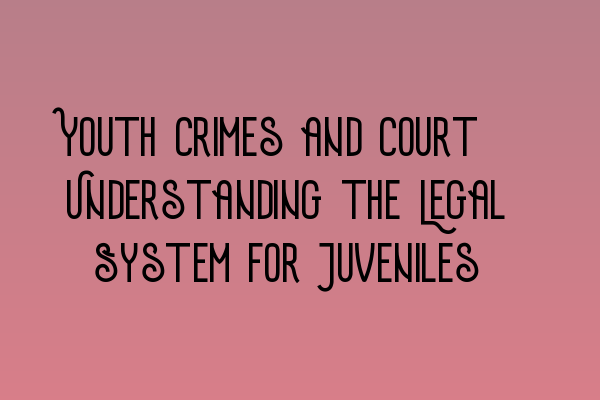Youth Crimes and Court: Understanding the Legal System for Juveniles
As a parent, educator, or concerned citizen, it is crucial to have a comprehensive understanding of the legal system when it comes to youth crimes and court proceedings for juveniles. The legal framework surrounding juvenile offenses is distinct from that of adults, with specific laws tailored to protect the rights and rehabilitation of young offenders.
In this article, we will delve into the intricate workings of the legal system for juveniles, providing you with invaluable insights and information.
The Juvenile Justice System in the UK
The juvenile justice system in the UK aims to preserve the well-being and welfare of young offenders while balancing the need for accountability and rehabilitation. When a minor commits a crime, they are handled differently than adults, considering their age, level of maturity, and capacity for reform.
One of the key principles of the UK juvenile justice system is the emphasis on diverting young offenders from the traditional criminal justice system. The system focuses more on rehabilitation, education, and support rather than punishment alone. Rehabilitative measures such as community service, probation, and counseling are utilized to redirect juvenile offenders onto a positive path.
Understanding the specific processes and procedures within the juvenile justice system is crucial for parents, legal professionals, and those involved in youth-oriented organizations. By having this knowledge, you can better protect the rights and interests of young people and contribute to their successful reintegration into society.
Key Stages in the Juvenile Justice Process
When a minor is accused of committing a crime, they undergo a series of stages within the juvenile justice process. Let’s explore the key stages:
- Arrest: When a minor is suspected of a crime, they may be taken into custody by law enforcement officials. It is essential to understand the rights of the accused at this stage, such as the right to legal representation and the right to remain silent.
- Intake: The intake process involves a thorough assessment of the minor’s background, including their family situation, education, and any prior offenses. This evaluation helps determine an appropriate course of action, which may include diversion programs or formal court proceedings.
- Diversion: Diversion programs aim to divert non-serious offenders away from the formal court system. These programs, such as counseling or community service, focus on addressing the root causes of the child’s behavior and offering rehabilitation opportunities as an alternative to punishment.
- Court Proceedings: In cases where diversion is not suitable or unsuccessful, the juvenile may enter the formal court system. Juvenile court proceedings differ from adult criminal court proceedings, focusing on the child’s best interest and their potential for rehabilitation. The court may impose measures such as probation, counseling, or placement in a specialized facility.
- Disposition: After the court reaches a decision, the disposition phase determines the appropriate consequences for the juvenile offender. This may involve the assignment of community service, participation in rehabilitative programs, or supervision by probation officers.
- Reentry and Rehabilitation: Upon completion of court-mandated consequences, the reentry and rehabilitation phase aims to support the juvenile’s successful integration back into society. This may involve continued counseling, educational opportunities, or vocational training to enhance their chances of becoming productive members of society.
Seeking Expert Advice and Support
When navigating the complexities of the juvenile justice system, it is essential to seek expert legal advice and support. At SQE Criminal Law & Practice Law UK, we specialize in criminal law matters, including those concerning juveniles.
Our team of experienced solicitors understands the unique challenges and considerations involved in youth crimes and court proceedings. We can provide you with professional guidance and representation, ensuring that the rights and interests of young offenders are protected throughout the legal process.
For further insights into criminal practice, we recommend checking out the following related articles:
- Workshops and Seminars on Criminal Practice: Expanding Your Expertise
- Updates in UK Criminal Laws: Staying Informed and Prepared
- Enhancing Your SQE Criminal Law Study Group Experience
- Decoding Criminal Evidence Rules: A Detailed Analysis
- Ensuring Rights of Victims in Criminal Procedures: Legal Protections and Support
By exploring these articles, you can expand your knowledge and deepen your understanding of criminal law matters beyond the scope of this article.
Should you require further assistance or have any questions regarding youth crimes and court proceedings, do not hesitate to contact us. Our team is always ready to provide you with the necessary support to navigate the legal system effectively.
Remember, by staying informed and educated, we can all work together to ensure a fair and just legal system for young offenders.
